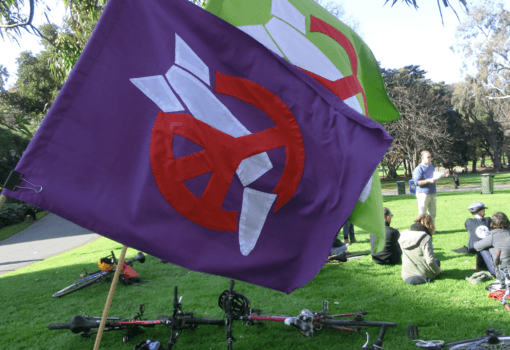
Photo by MAPW Australia | CC BY 2.0
The U.S., UK and France have never shown enthusiasm for banning and eliminating nuclear weapons. It is not surprising, therefore, that they did not participate in the United Nations negotiations leading to the recent adoption of the nuclear ban treaty, or that they joined together in expressing their outright defiance of the newly-adopted treaty.
In a joint press statement, issued on July 7, 2017, the day the treaty was adopted, the U.S., UK and France stated, “We do not intend to sign, ratify or ever become party to it.” Seriously? Rather than supporting the countries that came together and hammered out the treaty, the three countries argued: “This initiative clearly disregards the realities of the international security environment.” Rather than taking a leadership role in the negotiations, they protested the talks and the resulting treaty banning nuclear weapons. They chose hubris over wisdom, might over right.
They based their opposition on their belief that the treaty is “incompatible with the policy of nuclear deterrence, which has been essential to keeping the peace in Europe and North Asia for over 70 years.” Others would take issue with their conclusion, arguing that, in addition to overlooking the Korean War and other smaller wars, the peace in Europe and North Asia has been kept not because of nuclear deterrence but in spite of it.
The occasions on which nuclear deterrence has come close to failure, including during the Cuban missile crisis, are well known. The absolute belief of the U.S., UK and France in nuclear deterrence seems more theological than practical.
The three countries point out, “This treaty offers no solution to the grave threat posed by North Korea’s nuclear program, nor does it address other security challenges that make nuclear deterrence necessary.” But for the countries that adopted the nuclear ban treaty, North Korea is only one of nine countries that are undermining international security by basing their national security on nuclear weapons. For countries so committed to nuclear weapons and nuclear deterrence, is it not surprising and hypocritical that they view North Korea’s nuclear arsenal not in the light of deterrence, but rather, as an aggressive force?
The three countries reiterate their commitment to the Non-Proliferation Treaty (NPT), but do not mention their own obligation under that treaty to pursue negotiations in good faith for an end to the nuclear arms race at an early date and to nuclear disarmament. The negotiations for the new nuclear ban treaty are based on fulfilling those obligations. The three countries chose not to participate in these negotiations, in defiance of their NPT obligations, making their joint statement appear self-serving and based upon magical thinking.
If the U.S., UK and France were truly interested in promoting “international peace, stability and security” as they claim, they would be seeking all available avenues to eliminate nuclear weapons from the world, rather than planning to modernize and enhance their own nuclear arsenals over the coming decades.
These three nuclear-armed countries, as well as the other six nuclear-armed countries, continue to rely upon the false idol of nuclear weapons, justified by nuclear deterrence. In doing so, they continue to run the risk of destroying civilization, or worse. The 122 nations that adopted the nuclear ban treaty, on the other hand, acted on behalf of every citizen of the world who values the future of humanity and our planet, and should be commended for what they have accomplished.
The new treaty will open for signatures in September 2017, and will enter into force when 50 countries have acceded to it. It provides an alternative vision for the human future, one in which nuclear weapons are seen for the threat they pose to all humanity, one in which nuclear possessors will be stigmatized for the threats they pose to all life. Despite the resistance of the U.S., UK and France, the nuclear ban treaty marks the beginning of the end of the nuclear age.
David Krieger is President of the Nuclear Age Peace Foundation (www.wagingpeace.org). He is the author of Zero: The Case for Nuclear Weapons Abolition.